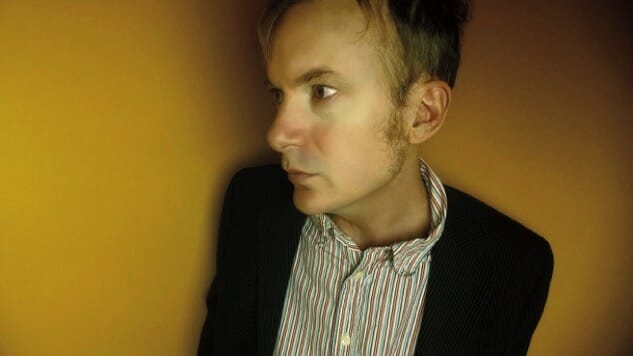Chris Collingwood on His New Project, Look Park

Chris Collingwood has some good news and some bad news. First, the uplifting bulletin: fans of his elastic, charismatic singing voice—one of the warmest in modern rock—can now hear it outside of its usual confines in Fountains of Wayne, his brainy power-pop combo with longtime songwriting partner Adam Schlesinger. Under the sobriquet of Look Park, he has just issued an eponymous debut on Yep Roc, produced by Mitchell Froom and bristling with edgy, oblique takes on traditional Top 40 tropes, like “Breezy,” “Aeroplane,” “Shout Part 1,” and songs that practically examine their own construction, “Crash That Piano” and “Minor is the Lonely Key.” Call it thinking-man’s music—the hooks don’t reveal themselves in an obvious initial burst, only upon repeated reflective listens. And now, the down side: Fountains of Wayne’s last album, 2011’s Sky Full of Holes, will probably be the last time you hear Collingwood in that particular context again. He and Schlesinger have parted ways, and FOW—for the time being, at least—is no more. With not even the possibility of a greatest-hits reunion tour. “I mean, maybe if somebody offered me a hundred million dollars, I would do it,” he snickers. “I would never rule it out completely. But I don’t see it happening, the way things stand right now—I’ve got too much other stuff going on.”
Paste: Do you still collect clocks?
Chris Collingwood: I have a lot of clocks! I have clocks everywhere, like antique clocks. And there’s a new clock. It doesn’t work actually, but it has big gold tentacles that come out from the center. The clock faces is maybe about six inches in diameter, but the whole thing is about three feet in diameter. It’s incredibly tacky and awful—it looks like a prop from that Harry Hamlin film, Clash of the Titans, I think it was.
Paste: Are they all set to the correct time?
Collingwood: The clocks in the house? No. No, actually—most of them don’t work. There’s some that work, but the batteries died and I never changed them, so they’re just for decoration. But I haven’t thought about them in a while, because there’s so much other clutter in my house right now. We cleaned out the Fountains of Wayne storage place in New York City, so my studio is full of guitars and keyboards and drums and amps. So there are a lot of other visual distractions around. And there are golf clubs—I’ve got a lot of those. But not nice ones. I just pick them up at yard sales and stuff.
Paste: Do you golf?
Collingwood: I do. Very poorly. And where I live [Northampton, Mass.], the winters are so incredibly unbearable that I feel like when the weather’s nice, there’s an imperative to get out and enjoy it. And there’s a really beautiful course about two miles from my house, and it’s cheap—I don’t go to the expensive courses. I would never go anywhere where I couldn’t hit the ball and feel like I had to hit it straight, because most of them go into the woods. And it’s a good way to get exercise. As you get older, you can’t really jog 10 miles a day, or at least I can’t.
Paste: The last time we talked, you had been battling seasonal affective disorder, as well as a sleep disorder.
Collingwood: Yeah. I used to take anti-depressants during the winter, and I slowly tapered off of those. Now I have these seasonal affective disorder lamps, and they simulate whatever frequency your brain is used to getting from the sun. So you’re basically tricking some lizard part of your brain into thinking that the sun is still out. But sleep is still an issue for me, so I take a lot of sleeping pills every night.
Paste: And you were having some psychotic episodes that first started on tour in Japan.
Collingwood: Yeah. Back then it wasn’t just pills for SAD. When I first got out of the hospital, which was at the end of 2006, I was also taking anti-psychotics for a year and a half. And I slowly tapered off of them, too. So I’m much better now.
-

-

-

-

-

-

-

-

-

-

-

-

-

-

-

-

-

-

-

-

-

-

-

-

-

-

-

-

-

-

-

-

-

-

-

-

-

-

-

-








































